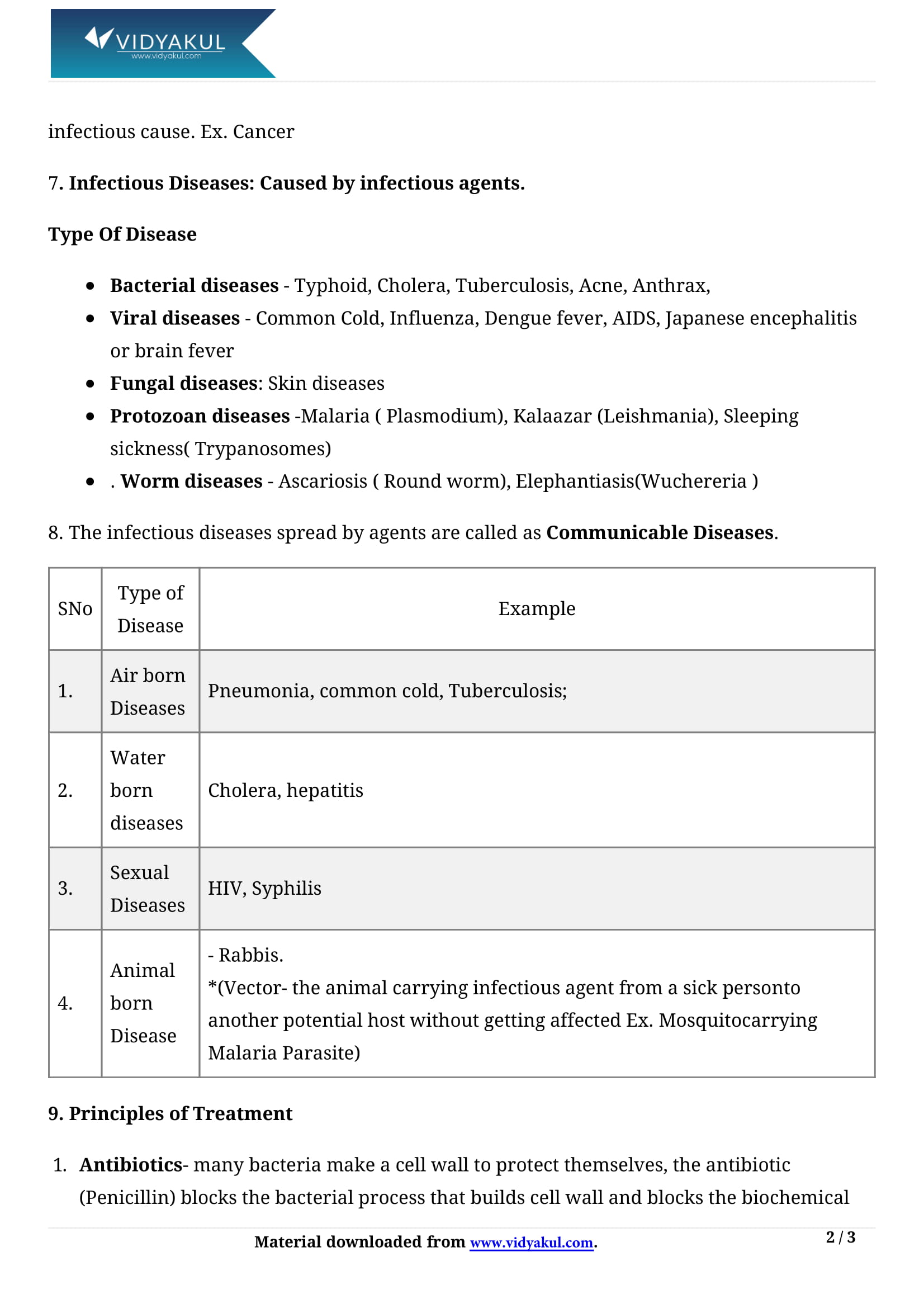Why Do We Fall ill Class 9 Notes

Chapter 13 Why Do We Fall ill
"Why do we fall ill" is one of the important chapters of the CBSE Class 9 exam. Health is a general state of well-being that includes physical, mental and social well-being. Human health depends not only on himself, but also on the environment. Without good health, it is impossible to fully perform normal daily activities and functions, physically, mentally and socially.
Learn about the meaning of health, various diseases, types, causes, transmission routes, symptoms, prevention methods, vaccinations, and treatment. Consulting and solving these notes should be one of the best ways to succeed on the CBSE exam. Notes are addressed accurately using language easy for 9th-grade students to understand. The notes provided are reviewed by a panel of experts and carefully designed to help you achieve the highest possible score on the CBSE exam.
Read on to find out more.
CBSE CLASS 9th CH-13
Points to Remember
Students should consider going through the important points so that they can score higher marks. Below we have provided the important things the students should go through:
The immune system is the part of the body that protects against pathogen infection, foreign body invasion, and other toxins. For example, there are certain specialized cells. Lymphocytes, macrophages, etc. that kill microorganisms that enter our body and help control their number. If our immune system is strong enough, we are less likely to get infected, and if it is weak, we are more at risk of getting sick.
The skin and mucous membranes act as protective barriers. If the skin protects the body from the outside, the mucous membranes protect the body from the inside.
WBC-leukocytes are called leukocytes or white blood cells. They are important components of our immune system and are present in our blood and lymph. They function by attacking and killing pathogens and protecting our bodies from pathogens and infections.
Macrophages are large, specialized cells of the immune system. These cells form in response to infection or as a result of the development of damaged or dead cells. They attack cancer cells by breaking them down and ingesting them. Natural killer cells combine with enemy cells and dissolve cell membranes, rendering cells unable to function.
Diseases can be caused by pathogens such as viruses or bacteria. Some diseases can also be caused by internal factors such as genetic mutations.
Antibiotics are antimicrobial agents derived from other organisms, such as fungi and some bacteria, used to treat harmful infections caused by pathogens or harmful microorganisms.
Students can learn more such important and interesting points about Class 9 Science Chapter 13 from Vidyakul.
Topics and Sub-topics
Vidyakul provides students with the NCERT notes for Class 9 Science Chapter 13, created by a panel of experts who understand the test design and scoring system followed by the CBSE Board. These notes helps students complete assignments on time and review chapters quickly. Before continuing with the document, let's go through the various sections and subsections of this chapter:
Few Important Questions
What are the function of the ‘Immune System’?
1. Fight germs/diseases which are caused by the pathogen 2. Recognise/neutralise the harmful substances 3. Protect us against harmful environmental substances.
What is a ‘macrophage’?
Macrophages are specialised cells involved in the detection, phagocytosis and destruction of bacteria and other harmful organisms.
What is a ‘Bacteriophage’?
A bacteriophage is a type of virus that infects bacteria. It is also known as the ‘bacteria eater’.
The immune system is the part of the body that protects against pathogen infection, foreign body invasion, and other toxins. For example, there are certain specialized cells. Lymphocytes, macrophages, etc. that kill microorganisms that enter our body and help control their number. If our immune system is strong enough, we are less likely to get infected, and if it is weak, we are more at risk of getting sick.
The skin and mucous membranes act as protective barriers. If the skin protects the body from the outside, the mucous membranes protect the body from the inside.
WBC-leukocytes are called leukocytes or white blood cells. They are important components of our immune system and are present in our blood and lymph. They function by attacking and killing pathogens and protecting our bodies from pathogens and infections.
Macrophages are large, specialized cells of the immune system. These cells form in response to infection or as a result of the development of damaged or dead cells. They attack cancer cells by breaking them down and ingesting them. Natural killer cells combine with enemy cells and dissolve cell membranes, rendering cells unable to function.
Diseases can be caused by pathogens such as viruses or bacteria. Some diseases can also be caused by internal factors such as genetic mutations.
Antibiotics are antimicrobial agents derived from other organisms, such as fungi and some bacteria, used to treat harmful infections caused by pathogens or harmful microorganisms.
What are the function of the ‘Immune System’?
What is a ‘macrophage’?
What is a ‘Bacteriophage’?
Learn more about the same in Why Do We Fall ill Class 9 Notes pdf.
Download this solution for FREE Download this PDF






